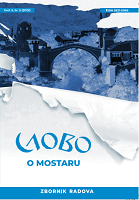CRTICE IZ MOSTARSKE SVAKODNEVNICE (KROZ DOKUMENTE KOTARSKOG ŠERIJATSKOG SUDA U MOSTARU U PERIODU AUSTROUGARSKE UPRAVE)
FRAGMENTS FROM MOSTAR’S EVERYDAY LIFE (THROUGH THE DOCUMENTS OF THE DISTRICT SHARIA COURT IN MOSTAR DURING THE PERIOD OF AUSTRO-HUNGARIAN ADMINISTRATION)
Author(s): Hana YounisSubject(s): Gender Studies, Cultural history, History of Law, Political history, Social history, Gender history, Sharia Law
Published by: Fakultet humanističkih nauka, Univerzitet »Džemal Bijedić« u Mostaru
Keywords: Mostar; sharia court; qadi; marriage; divorce; property; debts; inheritance;
Summary/Abstract: his paper, based on the material of the district sharia court in Mostar, depicts the way of life of the inhabitants of the city and surrounding places. Although only fragmentarily preserved, this material with its colorfulness indicates the most important aspects of everyday life and especially family problems. Documents show that qadi was a key witness of all life events, from the registration of birth to the registration of the death, represents the last hope in the protection of rights during family disputes. his especially refers to the issue of marriage, divorce but also inheritance, giving power of attorney, declaring adulthood, and checking “moral” behavior. All these questions are crucial for understanding the broader picture of everyday life and the change that occurred with the arrival of the Austro-Hungarian monarchy. he issue of the position of women and their rights during divorce and personal property management is especially emphasized. Does detailed analysis leads to the dilemma of how realistically the position of women has been presented in historiography so far?
Journal: Slovo o
- Issue Year: 5/2022
- Issue No: 5
- Page Range: 223-245
- Page Count: 23
- Language: Bosnian

